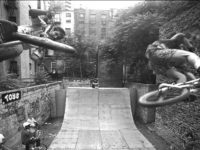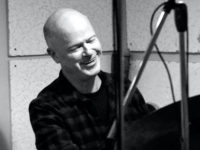Whit Dickey has been an understated but sturdy and vital figure on New York City’s Downtown scene for the last 30 years. This drummer excels whether he’s leading his own dates or acting as sideman, most famously as a long-time member of Matthew Shipp’s groundbreaking Trio.
Dickey is now penning a new chapter in his career with the imminent christening of his new record label Tao Forms, but there was a bit of unfinished business to take care of first with a double-disc album submitted to ESP-Disk label.
On May 29, 2020, the legendary avant-garde imprint will release Morph, which is actually two albums packaged as one: Reckoning is a duet with his old bandleader Shipp, while Pacific Noir is a trio with Shipp and trumpet sage Nate Wooley.
Reckoning puts Whit Dickey in familiar company, no doubt, but without a guy like Michael Bisio to anchor down the low tones, the plot retains a good measure of intrigue. For a song like “Blue Threads,” there’s a noticeable breeziness, and Dickey’s limber rhythms seems to direct Shipp’s phrasing the whole way. The sketches on “Reckoning” are darker hued, and the spaces between the notes are no less important to the song’s make-up.
Dickey’s carefully calibrated tonal splashes ushers in “Dice” and Shipp comes in to meet it with right handed tinkles that sound like light rain patter. The rain patter turns in a bit of a thunderstorm on the aptly titled “Thick,” a convulsive piece where Dickey resists the urge to ‘Keith Moon’ it and retains composure, playing with purpose even with a heavier footprint.
“Helix” resembles a mid-’60s Miles Davis track isolated to just the piano and drums; Whit Dickey manages to sounds lyrical on the drums and at strategic moments, he backs out and lets Shipp develop an idea alone.
“Steps” is a performance only possible from playing together for many years, because the clairvoyance is off the charts; especially in how the two change the thickness and tempo on the fly, and do it with elegance. The simpatico is also on the supernatural level for “Morph,” and the heightened tension on this song is a bonus.
For Pacific Noir Shipp’s role adjusts for the addition of Wooley, whose trumpet is vulnerable and colorful on “Noir 1.” The same kind of Shipp/Dickey affinity heard all throughout Reckoning is the kind of oneness of mind heard between Wooley and Dickey on the initial part of “Take the Wild Train.” By the end of the song, it’s a three-way séance. There’s a lot of pensiveness coming out of Wooley’s horn during “To Planet Earth,” and Shipp and Dickey use silence as a form of expression on an equal plane with tonality.
Wooley’s inventiveness is evident everywhere you turn. “Pulse Morph” is a melee, with Wooley assuming three different trumpet personalities: muted, unmuted and false notes. Wooley navigates the episodic journeys “Space Trance” and “Noir 3” with ease, with Dickey and Shipp acting as a single unit throughout the multiple mood pivots.
With his own record company to record for — the first one on Tao Forms is following this one by less than a month — others might have been content to mail it in. Whit Dickey’s mindset is playing at the highest level no matter the circumstances and Morph gives ESP-Disk another quality addition to its fabled catalog.




